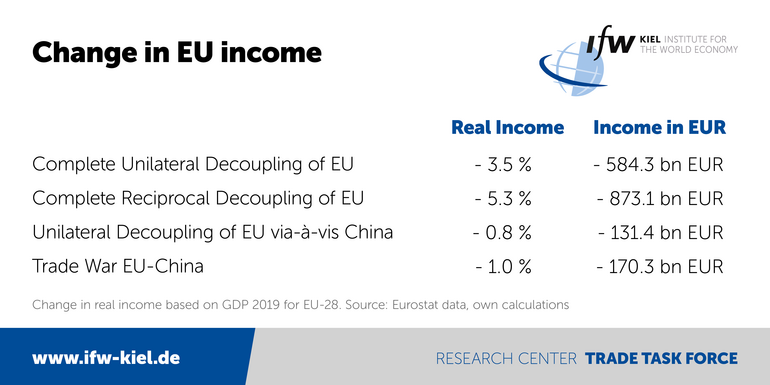News
Pursuit of economic autonomy can be costly for EU countries

The authors of the study "Decoupling Europe" have simulated what the consequences would be if the EU were to double its non-tariff trade barriers (NTBs) in order to promote domestic production. These NTBs include, for example, preferential public procurement rules, tax breaks or other subsidies for European suppliers, as well as import quotas or bans on selected goods. The findings: If the EU were to unilaterally take such steps to decouple itself from the rest of the world, it would permanently lose about 580 billion euros in price-adjusted income (relative to GDP in 2019), or 3.5 percent of gross domestic product (GDP), per year compared to a world without such additional barriers. If the other countries fought back and took comparable steps in return, the loss would grow to around 870 billion euros or 5.3 percent of GDP.
A decoupling of the EU is under discussion, particularly with regard to its strategic rival China. If the EU were to unilaterally double trade barriers against China, this would cost 130 billion euros (0.8 % GDP)—with comparable countermeasures by China, the costs would grow to 170 billion euros (1 % GDP).
"If the EU were to decouple even partially from international supply networks, this would considerably worsen the standard of living for people inside the EU as well as for its trading partners, and should thus be avoided by all means," says Alexander Sandkamp, one of the study's authors. “The alleged advantages of a higher degree of autonomy or sovereignty are hard to quantify and may well be illusionary, in particular if reshoring leads to a concentration of risk in a smaller number of markets. The recent flood disasters in Germany and elsewhere are sad proof that shocks can also occur on our doorstep.”

Germany would be hit particularly hard
As a particularly strong internationally connected economy, Germany would be hit harder than many other EU member states: Germany would bear around one-fifth of the costs of the entire EU if the EU were to decouple itself unilaterally from other countries—this corresponds to around 115 billion euros or 3.3 percent of German GDP. In the case of a unilateral decoupling from China, Germany would even bear around a quarter of the burden (32 billion euros, 0.9 % GDP). An escalating trade war with China could increase these costs by another 50 percent.
"European decoupling would lead to an increase in the cost of intermediates in the EU. This cost increase is then passed on along the value chains and increases the price of goods consumed in the EU as well as of EU exports, which in turn make goods more expensive in other countries. The results emphasize the role of global value chains and the unintended side effects that an EU autonomy policy could have," says Sandkamp. For example, non-EU countries such as Switzerland and Norway would be particularly hard hit in some scenarios because they are strongly integrated into the European trade network.
Need for action, but isolation is the wrong path
Within the EU, the costs would be very unevenly distributed: For example, small countries such as Ireland, Malta, or Belgium as well as the Baltic states would be relatively strongly affected if EU trading partners were to react with countermeasures to a more restrictive EU trade policy.
Some sectors in the EU would certainly benefit from a unilateral decoupling from China—such as wholesale and retail trade, construction, or machinery and equipment. But other sectors—especially vehicle manufacturing—would lose output. In the event of a two-sided trade war with China, the result would be negative across all sectors.
Despite the criticism of new trade barriers, the authors see a need for action to make the EU economy more resilient in the event of crises in international trade in goods. In their view, however, it would be better to, for example, diversify supply chains, promote advances in recycling and improve warehousing than to isolate from international value chains. "Unlike isolationism, such steps can help increase the crisis resilience of the European economy without forgoing the benefits of the international division of labor that has contributed to the prosperity of the continent and it’s trading partners alike," says Sandkamp.